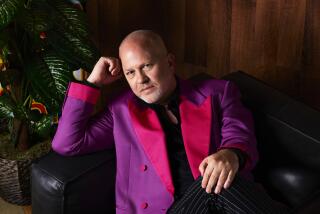The Monitor: ‘Eastbound & Down’
- Share via
So the options are these: You laugh with Kenny Powers, you laugh at Kenny Powers, you laugh at yourself for not laughing at Kenny Powers, you laugh at everyone else who does laugh at Kenny Powers.
How about just not laughing? Now in the middle of its second season on HBO, “Eastbound & Down” remains one of the most perverse, confounding shows on television, a miasma of upturned middle fingers, offhand racism, casual drug use and profanity, all buoyed by a potent sense of American exceptionalism.
And yet, it’s barely any fun. Boorishness could make for such better television than this.
This season, Kenny ( Danny McBride), a fallen baseball star, is in Mexico, attempting to jumpstart his career with a local team, the Charros, having left behind his family and ex-girlfriend in the United States. He is not thrilled by the locals. Soccer unnerves him. He tells Vida ( Ana de la Reguera), the object of his affection, “Even though you’re Mexican, you seem normal to me.” He asks the owner of his team, Sebastian Cisneros (Michael Peña), “How much exactly does it cost to buy a Mexican baseball team, 10 bucks and a burrito?”
Replies Sebastian, or maybe Peña: “That’s racism, man! I love to racism, bro.”
Coming from a creative team that includes McBride and filmmakers Jody Hill and David Gordon Green, “Eastbound & Down” isn’t exactly racist. But it isn’t exactly not racist, either. Kenny’s bloated, deeply American self-importance is meant to be an object of ridicule, but his pride is meant to be taken sincerely. His small-minded attitude about others is of course reprehensible, but he’s just as apt to get drunk and do cocaine with locals as he is to disparage them. In a sense, the show excuses his vileness by placing him in settings he himself perceives as vile. His delusion is treated as reasonable.
But Kenny is guilty of a greater crime than soullessness or vulgarity: He’s dull. His lines fall flat time and time again. They don’t feel like jokes so much as litmus tests for the viewer’s degree of comfort with mockery. When he learns Vida is cheating on him with Sebastian, he explodes: “This whole time I thought you were the whore with a heart of gold; instead you’re just a whore with a regular old whore’s heart.”
McBride is an assured actor, though that’s clearer when you view this show as drama, not comedy. Sometimes he slips into fits of emotional lucidity. “You remind me of home, and for obvious reasons home is painful to me,” he tells his sidekick Stevie (Steve Little), who’s followed him to Mexico unbidden. Stevie is less of a caricature than he was last season. His idolatry of Kenny has shifted from pathetic to assertive: Maybe he’s building toward a backlash.
Last season, Kenny overwhelmed his surroundings, friends and colleagues. This season, he faces challenges. His coach Roger (Marco Rodriguez) is persistent and, in a quieter way, as stubborn as Kenny is. Aaron (Deep Roy), Kenny’s running buddy in the early episodes of this season, is a little person with a spectacularly foul mouth, but who uses it for comedic effect. When Kenny threatens to rip off Aaron’s fake mustache, he replies with triumphant indignation, “I always carry two!”
Turns out Mexico isn’t the monolith Kenny perceives it to be, or needs it to be. And he’s not just in search of a respite from baseball and heartbreak there, but is also seeking out his father, who appeared briefly at the end of last week’s episode, played by Don Johnson, a stunt that triggered one of the only laughs this show has earned all season.
More to Read
The complete guide to home viewing
Get Screen Gab for everything about the TV shows and streaming movies everyone’s talking about.
You may occasionally receive promotional content from the Los Angeles Times.





